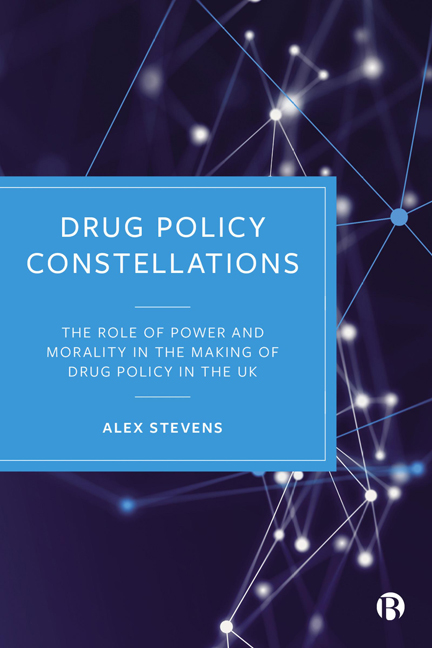Book contents
- Frontmatter
- Dedication
- Contents
- List of Figures and Tables
- About the Author
- Preface
- 1 An Introduction to Drug Policy Constellations
- PART I Contexts, Concepts and Methods for Studying Drug Policy Constellations
- PART II Morality and Power in UK Drug Policy Constellations
- PART III Cases in Drug Policy Making in the UK
- Notes
- References
- Index
6 - Moralities in Action: The Ethico-Political Bases of UK Drug Policy
- Frontmatter
- Dedication
- Contents
- List of Figures and Tables
- About the Author
- Preface
- 1 An Introduction to Drug Policy Constellations
- PART I Contexts, Concepts and Methods for Studying Drug Policy Constellations
- PART II Morality and Power in UK Drug Policy Constellations
- PART III Cases in Drug Policy Making in the UK
- Notes
- References
- Index
Summary
The central argument of this book is that policy is made through the interactions of people and organisations in policy constellations. These are loosely connected networks of people, brought together by shared normative preferences and material interests. They tend to want the same policies because they fulfil the same moral commitments and advance their social positions, often doing both simultaneously. The policy preferences that prevail and make it into government policy decisions are usually those that are held by the most powerful constellations.
In order to see whether and how this applies in UK drug policy making, it is necessary to identify the moral positions that are in play, to map the connections between policy actors and policy preferences, and to examine the forms of power that policy actors bring to these constellations. This will be done over the next three chapters in this second part of the book, which will show how it is possible to explain the outcomes of policy discussions.
The first of these three chapters uses ethnography and critical realist discourse analysis to analyse the moral positions that animate UK drug policy discussions. In my analysis, there are five common normative themes. I describe these positions as ethico-political bases because they mix moral commitments with political ideas to produce certain ways of thinking about the values that are most important to fulfil in drug policy.
Compassion is a common theme in policy discussions, even if it is expressed in different ways and towards different people. The other four bases for UK drug policy are commitments to traditionalism, paternalism, progressive social justice and liberty. These five ethico-political bases are shown schematically in Figure 6.1 and described later in this chapter. This diagram takes the form of a modified circumplex, with compassion at its centre, connected by clear lines with each of the other ethico-political bases. The bases that are diagonally opposite each other are morally incompatible. Those that are next to each other and connected by dashed lines can more easily be shared. The gap at the bottom between liberty and traditionalism is there because I observed little sharing of policy positions between policy actors who expressed these ethico-political bases.
- Type
- Chapter
- Information
- Drug Policy ConstellationsThe Role of Power and Morality in the Making of Drug Policy in the UK, pp. 61 - 75Publisher: Bristol University PressPrint publication year: 2024

